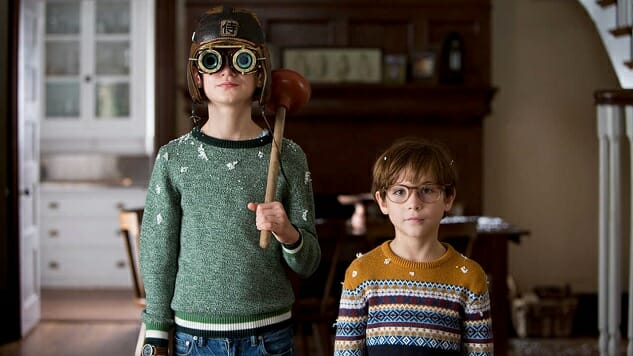The Book of Henry

Criticizing The Book of Henry is awkward, but describing it is nigh-impossible. If the movies produce a more disjointed effort in 2017, it’ll be a dysfunctional miracle; that they’ve already produced one as scattered as this, Colin Trevorrow’s follow-up film to his thunderously stupid 2015 box office colossus, Jurassic World, is baffling enough. It’s as if Trevorrow, riding high on a tidal wave of hype, studio clout and global legal tender drenched in both, was given a free pass to do whatever he wanted, and wracked by indecision he chose not one project, but all of them. You get the sense he started out making a kids adventure flick, realized it lacked throughlines involving child abuse and terminal illness, and proclaimed, “No. This will not do.”
Blend Rear Window’s paranoiac mystery with Matilda’s precociousness and Me and Earl and the Dying Girl’s insufferable twee dishonesty, and you still might fail to replicate The Book of Henry’s exact imbalance of bonkers incongruity. Ostensibly this is the story of Henry Carpenter (Jaeden Lieberher), the astronomically bright, overwhelmingly mature eldest son of single mother Susan (Naomi Watts). He’s the de facto man of the house, a role model and a protector of his younger brother, Peter (Jacob Tremblay). He’s the main bread winner, too, so gifted with stock market wheeling and dealing that he’s managed to set up his mother financially for life (though she refuses to quit her job at the local diner, no matter how crummy the shifts).
But most of all, he’s observant, and deduces that his neighbor, Christine (Maddie Ziegler) is the subject of untold debasements by her stepfather, Glen (Dean Norris), the police commissioner in their community, and so Henry makes it his mission to expose Glen’s crimes. No, wait: Most of all, he’s suffering from unexplained headaches caused by lord knows what. No, wait again: Every time you think you’ve got the film figured out, Trevorrow changes his mind and takes the story in a new direction, wholly unrelated to the direction he’d taken it just moments prior. He refuses to settle on a single mode, aesthetic, or intention, and hems and haws over every single narrative choice with reckless abandon. By consequence, watching The Book of Henry is a lot like noshing on an everything bagel, while driving an airboat through the nightmare tunnel in Willy Wonka’s chocolate factory at breakneck speed.
Put in uglier terms, the film is nauseating, but for a brief stretch of its duration it’s almost crazy enough to transcend its inexplicable hodgepodge. If nothing else, it’s at least charming by dint of its central cast, who vibe with one another in ways that offset the saccharine establishing details of Gregg Hurwitz’s script. The Carpenter family might be too cute for this world, but there’s something to be said for their over the top domestic bliss in this particular moment of American history, where the first family generates friction both within and without, and white dudes of age increasingly prove their unfitness as leaders. (Trevorrow is obviously fixated on unfit adult masculinity, hence his choice of protagonist, but says nothing of depth about masculinity’s place in modern society.) Susan reads Henry and Peter bedtime stories, tucks them in with kisses and endearments, and smashes at Gears of War so long as Henry doesn’t interrupt her fun to talk about Boring Important Grown-Up Things™.
-

-

-

-

-

-

-

-

-

-

-

-

-

-

-

-

-

-

-

-

-

-

-

-

-

-

-

-

-

-

-

-

-

-

-

-

-

-

-

-








































